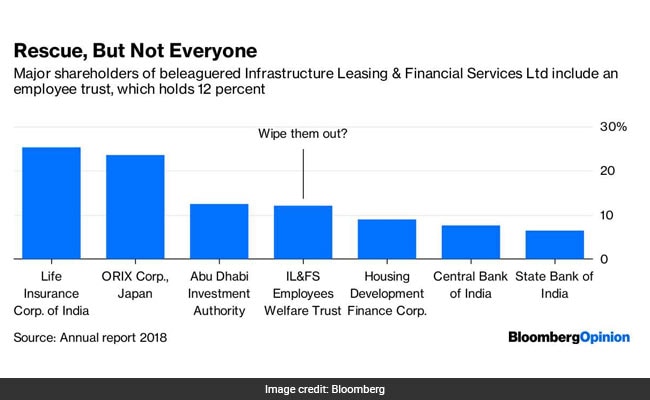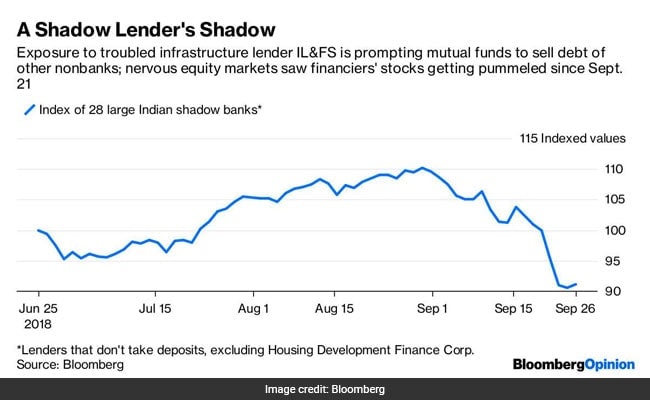
When even a 24-year-old Indian entrepreneur has no difficulty raising $1 billion in a day from global investors, it's easy to forget that it wasn't always like this.
Only two decades ago, a storied Mumbai financier could get away with raising $25 million of debt for a client, giving it just about half of that money five years later, and making the company service the full amount thereafter.
But what goes around, comes around. The institution that made a business of exploiting India's desperation for funds, particularly for long-gestation infrastructure projects, is now seeking to protect its assets from unpaid creditors trying to push it into bankruptcy.

Infrastructure Leasing & Financial Services Ltd. had 30 years to spawn an Indian clone of Macquarie Group: a powerhouse of finance, investments, asset ownership and risk management. Instead, Ravi Parthasarathy, the founder who stepped down recently as chairman, went on to build an unwieldy, debt-fueled empire that has now crumbled. Shareholders will have to move in to rescue IL&FS in their meeting on Saturday.
What went wrong? The $25 million that IL&FS arranged in 1997 via floating-rate notes - guaranteed by USAID and sold to Bear Sterns & Co. - illustrates the chutzpah that sank the firm. New Tirupur Area Development Corp., the borrower, was floated as a lifeline for a textile center in Tamil Nadu where industrial waste had polluted the groundwater. Tirupur's knitwear business and its households were suffering, but the state didn't have the $250 million required to draw river water, treat it and supply it to the town.
IL&FS showed the way out. Let New Tirupur get a 30-year contract for private water supply and handling of sewage, and a reasonable 20 percent annual return to lure investors who would share the equity risk with the government and IL&FS. The financial institution, which was also one of the lenders to the project, paid its share in September 2002, just as work on the water-treatment facility was about to start. But instead of the committed 1.4 billion rupees in equity, senior and subordinate debt - $29 million at the time - Parthasarathy released less than 1 billion rupees.
The big hole was a 46 per cent shortfall in the 900 million-rupee ($25 million) senior debt, owing to an inexplicable 150 million-rupee deduction. IL&FS said it was "costs relating to the USAID loan." A third of it was a commitment fee, and the rest was precious Bear Sterns dollars that had lain in an escrow account and bled, with net losses compounding at 12 per cent a year.
Thus, before New Tirupur could put a single brick on the ground, its stakeholders lost money they never even got to touch. The economics of the project became shaky, and a tussle began between equity holders and creditors. The government of Tamil Nadu had to pump in more public money. As a Madras High Court judge would later note, "Water started flowing (or trickling down) to the common users, both industrial and domestic, in May 2005. What flowed thereafter appears to be only litigation."

This became a pattern of behavior. For IL&FS to win, other stakeholders had to lose. Never mind if a 30-year concession on a toll road became a license to collect money from commuters in perpetuity. In New Tirupur, even state-run Life Insurance Corp. of India, the biggest shareholder in IL&FS itself, saw its equity interest diluted. As a result, it had to give up its board seat in the water company.
The irony is that the same Life Insurance Corp. may now have to lead the rescue of IL&FS before the money market's exposure to its toxic debt deepens a liquidity crisis for other shadow banks - a sort of a mini-Lehman moment for India. However, it would only be fitting to wipe out the 12 per cent stake held in IL&FS by the employees' welfare trust. The employees seem to have fared very well: Parthasarathy took home $3.65 million in his last year.
Next will come the inevitable question of dismemberment. Why should a systemically important financial institution have units running border check posts in an Indian state, or computerizing land records in the Philippines? The empire that Parthasarathy built has to go under the knife, and pretty soon.
Essential Business Intelligence, Continuous LIVE TV, Sharp Market Insights, Practical Personal Finance Advice and Latest Stories — On NDTV Profit.























